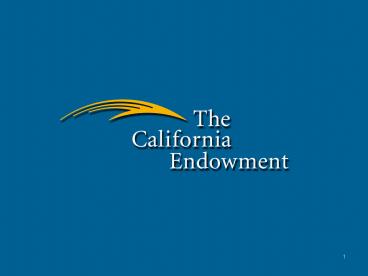Overview of the Strategic Planning Process PowerPoint PPT Presentation
1 / 20
Title: Overview of the Strategic Planning Process
1
(No Transcript)
2
The California Endowment Logic Model Preparatory
Meeting for Community Facilitators
Building Healthy Communities September 10,
2009 1100 AM - 1230 PM PDT
3
Objectives
- Develop a common understanding of the basic terms
and concepts of logic models - Understand the overall logic modeling process at
the big-picture level - Discuss what is needed to get ready for the logic
modeling process - Gain more clarity on the roles and
responsibilities of key partners in the logic
modeling process - Have an opportunity for questions, concerns, and
feedback
4
Agenda
- Using logic models for planning
- Basic terms and concepts of logic models
- Overview of the logic modeling process and key
components - Discuss readiness guidelines and what the process
would look like - Roles and responsibilities of key partners in the
logic modeling process - Questions, concerns, and feedback
5
Logic models for planning
- A tool to help your community figure out how to
achieve your goals - Helps manage the complexity
- Creates a visual picture of change
- Provides a general framework and common language
- Improves the evaluation
6
Logic model terms and concepts
7
Logic model terms and conceptsltexamplegt
8
Basic steps for logic modeling
9
Logic Modeling process - overview
Strategy 1
Strategy 2
Strategy 3
Resources
Capacities
10
The logic behind logic models
Its about the path to behavior
change Awareness Knowledge Attitude Motivation Sk
ills Opportunity Behavior
11
Categorizing Targeted Change Four Sectors
- What changes need to be made in the following
sectors - Education
- Health
- Human Services
- Community Environments
12
Types of change and change strategy
Type of change
Change strategy
Changes in policies, practices, norms within
specific systems
Advocating, Monitoring, Mobilizing
Policy analysis, Policy development, Voter
education, Policy maker education
Changes in governmental policies
Changes in rules and regulations Capacity
building
Long-term outcomes
Changes in specific institutions
Social marketing, Media campaign, Service
delivery reform
Group formation Organizing Mobilizing
Changes in neighborhood conditions and community
culture
Changes in individuals
13
Types of change and change strategyltExamplegt
Mobilize parents teachers
Voter education Voter mobilization
(Advocacy) Advocacy research
Educate Rec Centers on Facilities Design,
Planning and Maintenance
Healthy and productive teenagers
Provide health and fitness workshops for parents
Educate engage residents through park clean up
safety experiences
Family Activity Level Increases
14
Indentify critical capacities
Management Capacity
Technical Capacity
15
Logic Modeling Process
Planning Support Team (PST) and The Endowment
Program Officers work with the Collaboratives to
determine if they are ready to launch the logic
modeling process
Community stakeholders participate in 3-5
in-person meetings facilitated by Learning and
Evaluation Coaches and community facilitators
The Collaborative develops draft narratives with
support from Planning Support Team, The Endowment
staff, Learning and Coaches and other consultants
16
Guidelines for Assessing Readiness
- The collaborative
- Has a clear understanding of community priorities
- Has a beginning collaborative structure
- Has a representative group of people at the logic
model table who can bring in necessary knowledge
and skills as well as voices of all stakeholder
groups - Has clear steps for planning to plan
- Has begun to think systematically about their
capacity, tools and mechanism for insuring
community residents have a voice and say in the
plan and its implementation
17
Glossary of key partners
18
Glossary of key partners contd
19
Questions, concerns, and/or feedback
20
(No Transcript)

